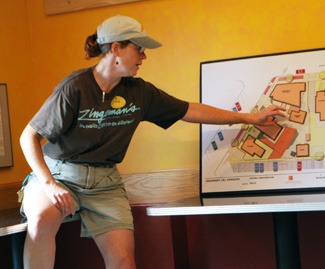Washtenaw County board of commissioners meeting (May 18, 2011): Two topics took up the bulk of time and attention during the most recent county board meeting: (1) proposals related to the Packard Square development in Ann Arbor; and (2) funding recommendations for nonprofits that provide human services to county residents.

Symbolic paper cranes were on display at the May 18, 2011 meeting of the Washtenaw County board of commissioners. The cranes represent the number of people in the county last year who used homeless support services. On screen in the photo’s background is Michael Appel of Avalon Housing, urging commissioners to support such services. (Photos by the writer.)
After much discussion, commissioners gave final approval to a brownfield plan for the Packard Square project, which will help fund environmental cleanup on the site of the former Georgetown Mall. The board also approved a $1 million grant application to the state Dept. of Environmental Quality for brownfield cleanup at the proposed $48 million development. Commissioner Wes Prater voted against the brownfield plan and the grant application.
The board postponed action until June 1 on a $1 million loan application to the MDEQ, as well as a request to authorize designation of the county’s full faith and credit as a guarantee for any loan that might be awarded, up to $1 million. They also discussed but ultimately postponed action on a broader public-private investment policy they’re developing, a policy spurred in large part by the request to back the MDEQ loan.
The policy discussion will likely be pushed back even further. At a May 24 briefing to review the June 1 agenda, commissioners learned from county staff that The Harbor Cos., developers of Packard Square, decided not to apply for the MDEQ loan. In light of that decision, the board is expected to take more time to flesh out details for its policy on public-private investment. And some commissioners – notably Leah Gunn – aren’t sure such a policy is even necessary. [Full Chronicle report on the May 24 briefing: "Loan Request Pulled for Packard Square"]
The other major item on the May 18 agenda related to funding for local human services nonprofits. The recommendations were made as part of a coordinated funding approach, combining support from the county, the city of Ann Arbor, the United Way of Washtenaw County, and the Washtenaw Urban County. More than 20 people spoke on the issue during public commentary, urging continued support for the county’s most vulnerable residents.
Commissioners were asked to give initial approval to $507,500 in human services funding for 2011. Additional funds for 2012 and 2013 were also approved, contingent on the board’s passing those budgets later this year – it’s possible that allocations will change, as the county works to eliminate a $17.5 million deficit. Commissioner Dan Smith voted against the allocations, citing an objection to one line item. He later clarified for The Chronicle that he objected to funding for Planned Parenthood.
The board acted on several other items during its May 18 meeting, including: (1) approval of a brownfield plan for LaFontaine Chevrolet in Dexter; (2) setting the 2011 rate for the county’s general operating millage; and (3) initial approval to hire Experis (formerly known as Jefferson Wells) to perform internal auditing services for the county.
The board also gave inital approval to apply for a federal Dept. of Justice grant worth nearly $500,000 to support the Washtenaw County Cyber Citizenship Coalition (WC4). Commissioner Kristin Judge, who spearheaded the WC4 initiative, reported that Gov. Rick Snyder has asked the coalition to host with him a statewide “cyber summit” later this year. [Full Story]





